Greek Prime Minister Alexis Tsipras has asked parliament to approve his reform proposals to creditors as a "national responsibility" that would keep the struggling nation inside the European Union.
"It is a choice of high national responsibility, we have a national duty to keep our people alive...we will succeed not only to stay in Europe but to live as equal peers with dignity and pride," Mr Tsipras said.
Tonight, Greece's international creditors have said they believe its latest debt proposals are positive enough to be the basis for a new bailout worth €74 billion an EU source said.
"There has been positive evaluation of the Greek programme," the source said, with the EU's bailout fund, the European Stability Mechanism ready to consider putting up €58 billion plus €16 billion from the International Monetary Fund for a new debt rescue.
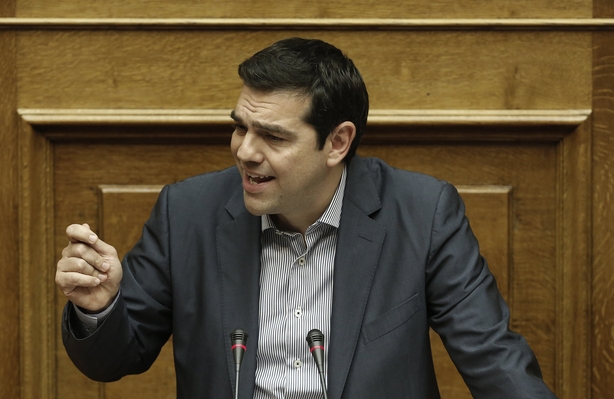
After walking into a party meeting to applause, Mr Tsipras is trying to rally Syriza behind the new proposals ahead of a snap vote in parliament expected late tonight.
He urged them to help Greece stay with the euro, but he faced some resistance from leftists stunned by his acceptance of previously spurned austerity measures.
The latest reform package was strikingly similar to the terms Greeks rejected in a referendum just last Sunday, angering members of the Syriza's hardline Left Platform wing.
The latest offer includes defence spending cuts, a timetable for privatising state assets such as Piraeus port and regional airports, hikes in value added tax for hotels and restaurants and slashing a top-up payment for poorer pensioners.
Five of them signed a letter saying it would be better to return to the drachma, Greece's pre-euro currency, than to swallow more austerity with no debt write-off.
"The proposals are not compatible with the Syriza programme," Energy Minister Panagiotis Lafazanis, who belongs to the far-left faction, told Reuters.
He declined to say how he would vote in the plenary ballot expected late tonight. "We will take it step by step."
Even with a rebellion from within his own ranks, Mr Tsipras was assured of backing from opposition lawmakers to carry the vote, but his political position would be weakened.
The centrist opposition To Potami party and the main centre-right opposition New Democracy said they would support him.
This evening, Greece's finance minister has pledged to strive for maximum gains for Greeks in aid talks with lenders, saying a referendum in which voters rejected creditors' demands had strengthened their standing in negotiations.
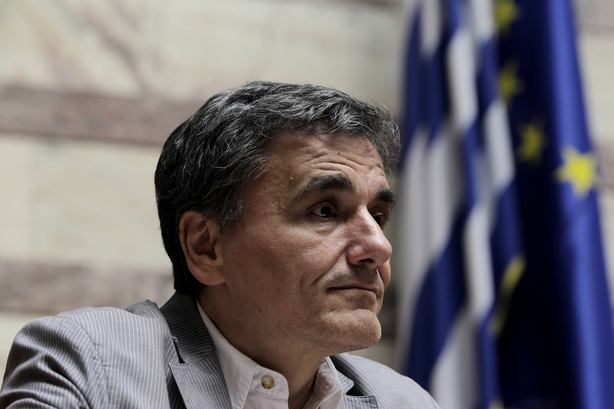
"If nothing changes on Monday, and if we don't all play a part in a new day dawning, then we will have a major problem,"Euclid Tsakalotos told a parliamentary debate called to rubber-stamp the tax package as a basis for talks.
A senior Greek banker has said that Greece's banks will need an estimated €10 to 14bn of fresh capital to keep them afloat and more time before they reopen even if a deal is reached with European creditors on Sunday.
Shut for two weeks, banks have relied on an ECB-approved emergency credit line from the domestic central bank to dispense rationed cash and are hoping that they can be reopened by the end of next week, despite having bled more than €34 billion of deposits since December.
Officially, the banks are due to reopen on Tuesday.
National Bank, Piraeus, Eurobank and Alpha, which account for about 95% of the industry, will likely need to be recapitalised after an assessment by regulators and are not likely to return to a semblance of normalcy for months.
Athens would seek to raise the money from private investors, but if it proves futile, banks may get a capital injection from the European Support Mechanism's Direct Recapitalisation Instrument (DRI), a new facility which has so far been unused.
It is unclear yet what conditions would be imposed by the ESM in return for such capital, although it is expected to involve a commitment to major restructuring of the Greek financial sector.
The European Stability Mechanism declined to comment on options in Greece but has made clear the rules for its new re-capitalisation instrument are stringent and capital from European taxpayers will only be injected after a "bail-in" of the bank's own resources, as well as a contribution from a national resolution fund.
A bail-in could involve cash calls from bank shareholders, haircuts to bondholders, or potentially haircuts to some depositors, as in the case of Cyprus two years ago, although the Greek government says it opposes this.
Cyprus targeted deposits over €100,000 but only about 20% of deposits in Greece are over €100,000, much of them belonging to small businesses.
Greece's latest offer
Mr Tsipras has called a snap vote in parliament asking for its backing to negotiate a list of "prior actions" - measures his government would take to convince creditors of its intent ahead of negotiations and to secure the first disbursement.
Former Finance Minister Yanis Varoufakis, who alienated many euro zone partners with his outspoken lectures, said in a statement he supported the effort to renegotiate Greece's debt but was unable to attend parliament "for family reasons".
The latest offer includes defence spending cuts, a timetable for privatising state assets such as Piraeus port and regional airports, hikes in value added tax for hotels and restaurants and slashing a top-up payment for poorer pensioners.
"The 'No' in the referendum appears to be turning into a'Yes' from Mr Tsipras," Commerzbank analyst Markus Koch said.
Greek banks have been closed since 29 June, when capital controls were imposed and cash withdrawals rationed after the collapse of previous bailout talks.
Greece defaulted on an IMF loan repayment and now faces a critical 20 July bond redemption to the ECB, which it cannot make without aid.
The country has had two bailouts worth €240 billion from the eurozone and the IMF since 2010, but its economy has shrunk by a quarter, unemployment is at more than 25% and one in two young people is out of work.
"The prime minister seems to have made the right choice between his party and the interest of Greece," an editorial in the centre-right daily Kathimerini said.
"His decision to accept a tough package of measures will ensure the country stays in the euro.
This is not the time for gripes and assessing the damage, what's most important is securing the country's interests and its place in the eurozone."
Opinion poll suggests 84% of Greeks want euro
An opinion poll suggests that 84% of Greeks want to keep the euro, with just 12% favouring a return to the drachma as the country races to clinch a cash-for-reforms deal with its creditors.
The poll by Metron Analysis for Parapolitika newspaper showed that although the overwhelming majority of those polled want to remain in the single currency, 55% said it was the right choice to vote 'No' in last weekend's referendum on tough austerity measures.
But a second survey by the University of Macedonia showed supporters of the left-wing Syriza party of Prime Minister Alexis Tsipras were split over whether a return to the former Greek currency, the drachma, was a better option.
Whilst 47.5% of respondents backing Syriza said they preferred to keep the single currency, 40% believed returning to the drachma was the better option.
The poll also found that Greeks were deeply pessimistic about the performance of the economy in the next 12 months.
Nearly 60% percent of those surveyed said their household finances would either definitely or probably worsen over the next year with less than one in 10 saying the situation would either certainly or probably improve.
Despite that, Syriza maintained a commanding lead over the opposition conservatives, with 45.6% of Greeks saying they would vote for the party were there to be parliamentary polls, according to Metron Analysis.
That was more than the 36.3% vote share the party won in January's election
The centre-right New Democracy party has seen its support drop from 27.8% to 22.7%.
The University of Macedonia poll questioned 633 adults over 18 years of age on 9 July.
It was not clear when the Metron Analysis poll was conducted.
Thousands protest outside parliament in Athens
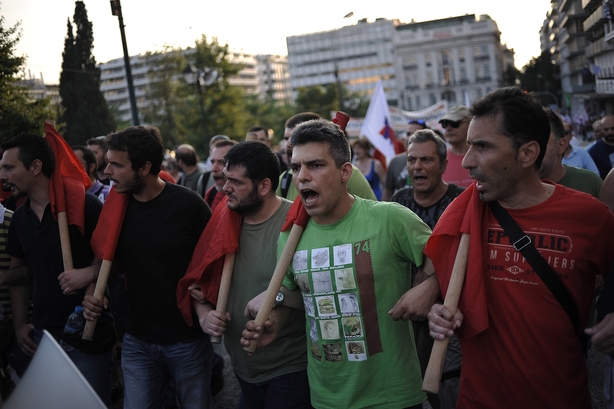
Several thousand leftist demonstrators protested in front of parliament in Athens ahead of a vote to support a package of cuts and tax hikes that closely resembled a similar package rejected in a referendum on Sunday.
The rally was smaller than the big demonstrations that took place just before last week's referendum but it underlined the deep resistance to fresh doses of austerity facing the government from the left.
Demonstrators chanting slogans and waving banners with messages such as "Greece is not a colony" and "No, overturn the bailout" gathered near Syntagma Square in central Athens.
International reaction as Greek government decides on package
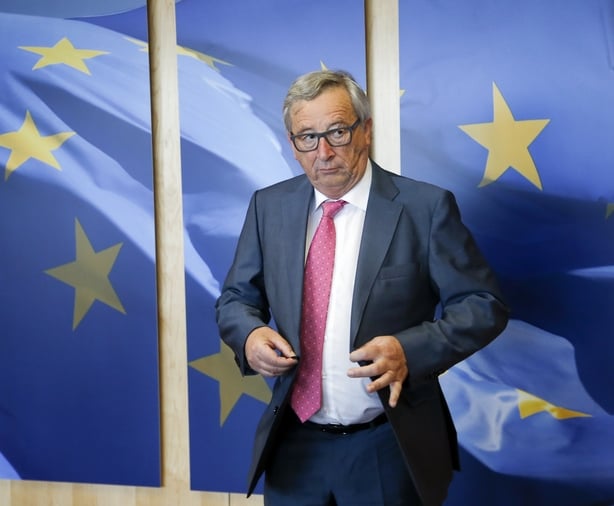
Germany, which has contributed more to bailouts than any other country, sounded wary.
A finance ministry spokesman ruled out any debt restructuring that would lower its real value.
France, Greece's strongest supporter in the eurozone, rushed to offer praise.
President Francois Hollande called the offer "serious and credible".
Eurogroup head Jeroen Dijsselbloem described it as a "thorough piece of text" but declined to g ointo specifics.
"Broad support in Greece gives it more credibility, but even then we need to consider carefully whether the proposal is good and if the numbers add up," he told reporters. "One way or the other, it is a very major decision we need to take."
The lenders' backing is crucial for eurozone leaders to support the proposals.
Mr Dijsselbloem, European Commission President Jean-Claude Juncker, European Central Bank President Mario Draghi and International Monetary Fund head Christine Lagarde discussed the plan in a teleconference.
In the US, The White House said it welcomes the latest proposal by Greece to resolve its debt crisis and that it was something for that country's creditors to weigh.
Whitehouse spokesman Josh Earnest said "we have seen and we certainly welcome the proposal that was put on the table by Greece."
He said that "It is something that's currently being considered by their creditors. We have said for quite some time now that the solution or resolution to Greece's financial challenges is a package of reforms and financing that will put Greece back on the path of economic growth and debt sustainability."
Mr Earnest said: "Doing so will allow Greece to remain part of the Europe's currency union, and that's something that we believe, that the Greeks have articulated is in their interests.
Market reaction
An EU based source has said that Greece's international creditors believe its latest debt proposals are positive enough to be the basis for a new bailout worth €74 billion.
"There has been positive evaluation of the Greek programme," the source said, with the EU's bailout fund, the European Stability Mechanism ready to consider putting up €58 billion plus €16 billion from the International Monetary Fund for what would be a third debt rescue.
The source, who asked not to be named, said the creditor's assessment of the Greek plan would now go to the Eurogroup of 19 eurozone finance ministers who meet Saturday but it stood only a "50-50" chance of approval due to opposition by hardliners such as Germany who oppose any debt relief for Athens.
The finance ministers in turn will prepare a report for eurozone leaders who meet Sunday, followed by an emergency summit of heads of government from all 28 EU member states.
Irish reaction
Earlier, Taoiseach Enda Kenny said all of the eurozone leaders want Greece to remain in the single currency and that country would have the support of its European colleagues to help create jobs and investment under the proposed bailout programme.
Press Conference with Taoiseach @EndaKennyTD and Italian Prime Minister @matteorenzi pic.twitter.com/cKsvp1841d
— MerrionStreet.ie (@merrionstreet) July 10, 2015
He was speaking after talks with Italian Prime Minister Matteo Renzi who said he hoped that European finance ministers would be able to approve a deal tomorrow and that a meeting of leaders would not then be necessary.
In their half hour meeting the two leaders discussed Greece and issues affecting Ireland and Italy including trade and migration as well as the proposed UK referendum on EU membership.
Former IMF deputy director Donal Donovan has said Greece may have done enough with their latest set proposals to stave off the prospect of a 'Grexit' over the weekend.
Speaking on RTÉ's Today with Sean O'Rourke, Mr Donovan said the main questions surrounding this latest set of proposals will be whether Mr Tsipras' parliament will approve them.
He said there is also the question of whether the measures will actually be implemented.
Mr Donovan also said the question of a write down is something of a red herring, because Greece is not actually paying very much in debt servicing at the moment.
Additional Reporting: Paul Cunningham
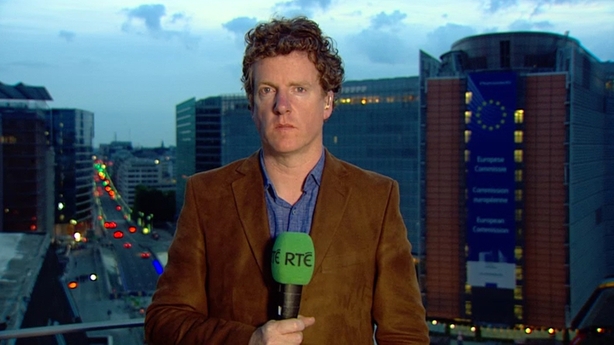
An emergency summit of EU leaders to discuss the Greek debt crisis may not take place on Sunday as scheduled.
A senior EU official said in Brussels that if eurozone finance ministers can agree on a debt plan for Greece then a summit "may not be required."
He added: "If there is no agreement however, it is pretty clear what the consequences will be."
It was clarified that that any decision on Greece must be taken on the basis of unanimity, although there was a provision for a finance minister to abstain.
Six of the 19 countries in the eurozone have a requirement that their parliaments must back any new bailout for Greece - including Germany, Holland, Finland and Slovakia.
Under the ESM treaty, one of the three issues which they will examine is Greek debt sustainability - and therefore this question will be a central part of discussions.

